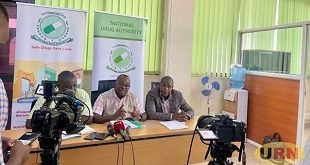
Kampala, Uganda | THE INDEPENDENT | Pharmacists under the Pharmaceutical Society of Uganda want the National Drug Authority-NDA to make changes in its drug-testing protocols.
Samuel Opio, the President of the Pharmaceutical Society of Uganda says that while drug recalls are common, NDA is mandated to make sure that all the products that end up on the market are safe. He says that even without international recalls, NDA should have checks and balances to ensure that all medicines on the market are safe.
“At the moment, the only testing that is carried out is for mandatory drugs such antimalarial. Other drugs are tested when they are already on the market. And this has shown to be a problem,” Opio said.
According to Opio, the many recalls that have been issued during 2019 are a sign that more needs to be done. He suggests that NDA should carry out more extensive testing.
“NDA needs to see how to minimize recalls. They need to see that whatever enters the market needs to complete its shelf life without it being pulled off. They have to strengthen premarket testing. They rely now on post-market but premarket testing is needed. Mandatory testing should be carried out for more products,” Opio explained.
At the moment, Uganda only carries out mandatory testing for ARVs, antimalarial and condoms because they are categorized as important medicines.
Four big recalls have been issued this year. The first recall occurred in September 2019 when Cipla recalled Hepatitis B drugs Texavir because their quality was affected due to poor packaging.
In October, following warnings made by international drug agencies like the US Food and Drug Administration, NDA recalled popular ulcer and heartburn medicine Zentac because it was discovered to have cancer-causing molecules. The authority also recalled 14 painkillers and antibiotics that were manufactured by China-based company Zhejiang Ruixin Pharmaceutical Co Ltd and imported by Astra Pharma (U) Limited.
Despite all these recalls, NDA says that instead of people questioning its credibility, they should be applauding for a job well done. According to NDA, the recalls are evidence that the authority is working.
Dr David Nahamya, the secretary to the authority says that recalls are normal things that happen from time to time due to the ever-changing field of medicine. He says that the body has carried out its mandate.
While NDA says the drug recalls are not something to worry about, the recalls brings question of how drugs end up on the market. Ideally, before a drug can be allowed onto the market, there must be evidence that the drug is safe. If a drug is being locally manufactured, NDA has to get samples of the compounds and finished product and subject them to testing upon which a certificate is issued.
Importers or distributors of drugs need to apply for an import permit from NDA. Once NDA receives the application, it verifies the application by checking to see a need of the drug and whether it is cleared and licensed by international drug or health regulatory companies like World Health Organisation or the Food and Drug Administration in the USA.
If the drug appears on the register, NDA then makes a site visit to the country of origin of the drug to ascertain whether Good Manufacturing Processes- GMP are met during the production of the drug. These take into account the environment drugs are being manufactured in, the level of sterilization and availability of personal protective equipment.
If GMP standards are met, NDA then clears the import license and the drug can be imported into the country. It must be accompanied by a certificate of analysis which shows that the drugs were tested and passed international manufacturing standards.
According to data from the ministry of health, 90 percent of the drugs that are consumed in Ugandan are imported. Only 10 percent are manufactured within the country.
Dr Nahamya says that they are working as an authority to be able to carry out more testing of drugs.
“We have large volumes of drugs that enter the country but we cannot test everything due to human resource challenges and also technical ability. But we are working on this. We are building a new laboratory that will increase our ability as a country to test what is on the market,” Dr Nahamya says.
******
URN
 The Independent Uganda: You get the Truth we Pay the Price
The Independent Uganda: You get the Truth we Pay the Price


